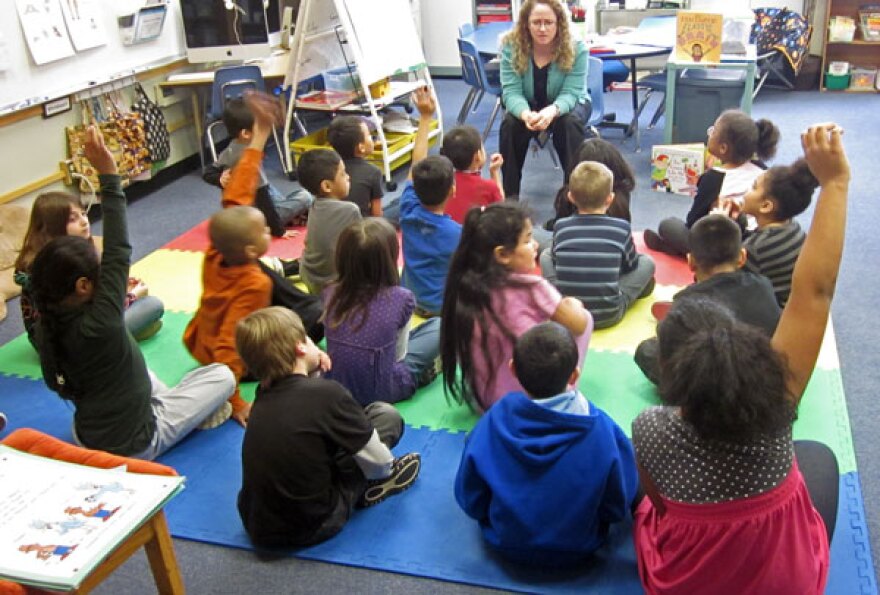For years, Airport Heights Elementary School has had a hard time attracting students from the neighborhood right next door. The school has struggled with low achievement scores and those statistics have convinced dozens of neighborhood parents to drive their kids to higher performing schools in the district. But this year, teachers and administrators at Airport Heights have started an initiative they hope will lure those families back.
A circle of second-graders dance and sing along with their teacher at Airport Heights Elementary School. Teacher, Marcy Jasper, says the singing and many other activities at the school are part of something they're calling “Dream Big Academy.”
“The Dream Big Academy is a way of stepping back from what we do traditionally maybe in a lot of classrooms and recognize that the best way to achieve excellence in academics is to make sure we have students who know how to interact with others positively, respectfully and responsibly and safely,” Jasper said.
“Dream Big” gives Airport Heights teachers 12 weeks out of the school year to try original curriculum or projects that encourage their students to explore non-traditional subjects. The aim is to make learning relevant. The result is things like singing and dancing to promote social and emotional learning. Older students are doing projects. One group is growing basil and selling it to local restaurants. In the process, they're learning science, entrepreneurship and teamwork. The “Dream Big Academy” is the brainchild of staff, parents, some community members and Principal Michael Webb.
“The Dream Big Program is just the way Airport Heights is looking at offering our kids access to what school's about, where they can go in their life – why the school's important to them because of what they're going to be when they grow up,” Webb said. “We provide a lot of opportunities for hands on experience.”
Today, Linnet Moser is teaching her kindergartners about careers. Her students sit in a circle matching tools with careers, as a way to build vocabulary.
“Would a gardener need a fire extinguisher? Noooo! Would a firefighter need a fire extinguisher? Yes!,” Moser said.
Moser says learning the vocabulary is important because at least 5 of her 17 students did not speak any English when they started school.
“The kids are coming in with Hmong, Samoan, Tagalog from the Philippines, Spanish, several Alaska Native dialects.,” Moser said.
More than 30 percent of the 335 or so students at Airport Heights are Asian and Pacific Islander and nearly 20 percent are Alaska Native and American Indian. More than a dozen languages are spoken at the school and one third are English language learners. It's a Title 1 school and receives extra funding to provide support to economically disadvantaged kids. Eighty-five percent qualify for free and reduced lunch. Back in 2006, areas south and east of the school were incorporated into the school during a rezoning of the district. Since then, test scores have plummeted. Last year, 44 percent of 5th graders were not proficient in reading. Almost 70 percent of 3rd graders were not proficient in math. Numbers like that were concerning to Kjerstin Thomas – so she chose a different school for her daughter.
“It was really hard for me to see 30-40-50 maybe 60 percent proficient in any area – a lot of 40s. And so that was a big part of it really. Because my daughter was going into school starting to read. And I felt like, is she going to have any peers who are ready to go with her or is the teacher going to be overwhelmed?,” Thomas said.
Thomas, a former classroom teacher, would prefer to send her kids to the school right around the corner. Her younger son starts school in a few more years and she says she would consider enrolling both kids at Airport Heights, if the school improves.
Harmony Lanen Roll lives a few streets down from Thomas. She also worked as a teacher, in a Title 1 School, before having kids. Her older son starts kindergarten the year after next, and she says wants to send him to Airport Heights.
“Community is a huge part of it. You know, knowing your neighbor’s kids are going to school with your kids and that they're walking to school together. I think the diversity would be amazing. I want my kids world view to be opened up by seeing other cultures,” Roll said.
Roll is hoping the “Dream Big Academy” will spur overall academic improvement at Airport Heights. If it does, she'll consider enrolling her son. Principal Webb says concerns about test scores are understandable. And he wants neighborhood parents to know that Airport Heights Elementary is making progress. Last year reading and writing scores went up by about 3 percent. And he has a message to neighborhood parents.
“It's about school choice for parents – that they want to make the best choice for their kids. And really, when parents come in and tell me this I say, you know what, I take my hat off to you. That's what we want in parents in our school district. The part I wanted to say to them too is I would invite you to come and knock on my door and say look, 'I want you to fix this school because I should have a school like that in my own neighborhood,” Webb said.
More involvement by local parents, Webb says, could also help improve the school. In the Meantime, Webb hopes the “Dream Big” program will keep test scores and student learning heading in the right direction, and perhaps get those neighborhood parents to give the school another chance.
Listen to the full story


